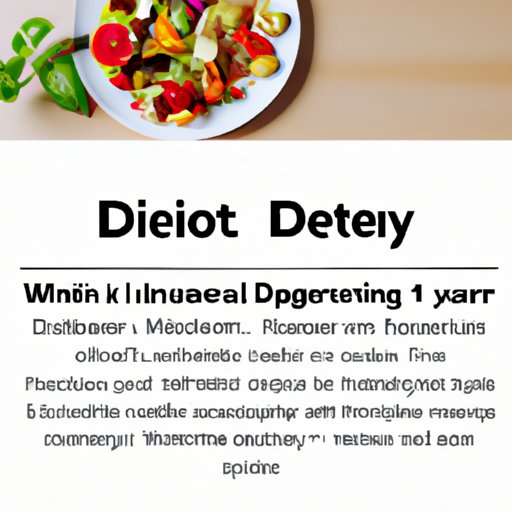
Introduction
Dieting is a perennially popular topic, with countless diets and weight loss plans available for those looking to manage their weight, improve their health, or simply feel better. Unfortunately, the sheer abundance of dietary information can be overwhelming, leaving many people confused about what a diet truly means and how to approach it in a healthy way. In this article, we’ll explore the meaning behind what we eat, debunk dietary myths, and offer practical advice for building a healthy, sustainable diet.
The Evolution of Diet: How Our Perceptions and Understanding of Nutrition Have Changed Over Time
Throughout history, diets have taken many forms, from ancient civilizations that prized simple, whole foods to modern-day fads that promise quick weight loss. But despite the endless variety of diets over the years, our understanding of nutrition has remained relatively constant. We now know that a balanced diet rich in whole grains, lean proteins, fruits and vegetables is key to maintaining good health. While different diets may focus on different foods or exclude certain food groups, the core principles of good nutrition have remained relatively unchanged.
Of course, that hasn’t stopped some diets from popping up and gaining popularity over the years. For example, the low-fat craze of the 90s led to a slew of products marketed as “fat-free” or “low-fat,” which often contained added sugars and other unhealthy ingredients. The 2000s marked the rise of low-carb diets like Atkins, which emphasized protein and fat intake over carbohydrates. More recently, the Keto diet has gained popularity for its emphasis on high-fat, low-carb eating.
Debunking Dietary Myths: What A Diet Really Means and How to Make the Most of It
Before we can talk about building a healthy diet, it’s important to define what we mean by “diet.” Unfortunately, the word has taken on a negative connotation over the years, often associated with deprivation, restriction, and unsustainable habits. But in reality, a diet is simply the types of foods that a person eats. Whether someone eats a wide variety of whole foods or subsists on fast food and junk, they are following a diet.
That being said, not all diets are created equal. Some diets, like the standard American diet that is high in processed foods, are associated with higher rates of obesity, heart disease, and other health problems. Others, like the Mediterranean diet, are linked to better health outcomes. The key is to build a diet that is both healthy and sustainable, with plenty of variety and nutrients.
One of the biggest dietary myths is that all calories are created equal. In reality, the quality of the calories matters just as much as the quantity. For example, a 100-calorie snack of almonds will provide more nutritional benefit than a 100-calorie pack of cookies, even though they have the same calorie count. Another misconception is that cutting out entire food groups is necessary for weight loss or good health. While some diets like the Paleo diet exclude certain foods, most people can benefit from a variety of foods, as long as they are the right types and consumed in the right quantities.
So how can you make the most of your diet? Start by focusing on whole, unprocessed foods like fruits, vegetables, whole grains, lean proteins, and healthy fats. These foods are packed with nutrients and are less likely to cause blood sugar spikes or other health problems. Additionally, try to limit or avoid processed foods, sugary drinks, and indulgences like candy and desserts. While these foods may be enjoyable in moderation, they offer little nutritional value and can contribute to unhealthy habits.
Decoding the Language of Diets: A Guide to Understanding Popular Diet Plans and Their Benefits
In recent years, a host of new diets have emerged, each promising to help people lose weight, improve their health, or both. But with so many options available, it can be hard to know where to start. Some popular diet plans include:
- Keto: A high-fat, low-carb diet that is designed to put the body into a state of ketosis, burning fat for energy instead of carbs.
- Paleo: A diet that focuses on whole, unprocessed foods like meat, fish, vegetables, and fruits, while excluding grains, dairy, and processed foods.
- Vegetarianism: A diet that eliminates meat but may include dairy, eggs, and other animal products.
While different diets may work for different people, it’s important to understand the benefits and drawbacks of each plan. For example, the Keto diet can be effective for weight loss, but it may be difficult to sustain in the long term and can lead to nutrient deficiencies if not followed properly. Likewise, the Paleo diet removes some healthy foods like legumes and whole grains, and may be difficult for vegetarians or vegans to follow. By understanding the nuances of each diet plan, you can make a more informed decision about what is best for you and your body.
Beyond Restriction: How to Approach a Diet in a Healthy and Sustainable Way
One of the biggest pitfalls of dieting is the tendency to focus on restriction and elimination. Many diets forbid certain foods or food groups, leading to feelings of deprivation and a higher likelihood of bingeing or overeating. Instead of approaching a diet with an all-or-nothing mindset, try adopting a more balanced, sustainable approach.
One way to do this is to practice “flexible restraint,” which focuses on enjoying a variety of foods while being mindful of portion sizes and snacking habits. Another approach is to focus on moderation and balancing indulgences with healthier choices. For example, if you enjoy a piece of cake, try balancing it with a healthy dinner or exercise session.
Additionally, try to incorporate plenty of nutrient-dense foods into your diet, like leafy greens, colorful fruits and vegetables, and lean proteins. These foods will not only provide valuable nutrients, but they will also help keep you feeling full and satisfied between meals.

The Psychology of Dieting: Why We Diet and How to Maintain a Healthy Relationship with Food
Dieting can be an emotional and psychological endeavor, often driven by societal pressures to look a certain way or achieve a certain weight. Unfortunately, this pressure can lead to unhealthy habits and negative self-talk. To maintain a healthy relationship with food and avoid the pitfalls of diet culture, it’s important to focus on self-care, self-compassion, and mindfulness.
One way to do this is to practice mindful eating, which involves paying attention to your body’s hunger and fullness cues, savoring your food, and avoiding distractions like TV or phones while eating. Additionally, try to cultivate a positive relationship with your body, focusing on what it can do rather than how it looks. Finally, acknowledge that everyone’s body is different, and that there is no one “right” way to look or eat. Building a healthy relationship with food starts with a healthy mindset.
Building a Better Diet: Practical Tips for Incorporating More Nutritious Foods into Your Daily Routine
Building a healthy, sustainable diet doesn’t have to be complicated. Try these tips for incorporating more nutritious foods into your daily routine:
- Plan meals ahead of time: Planning meals ahead of time can help avoid the temptation to reach for unhealthy convenience foods.
- Try new foods: Experiment with new foods or cuisines to add variety and interest to your diet.
- Make healthy swaps: Try swapping out unhealthy ingredients for healthier ones, like using Greek yogurt instead of sour cream or enjoying unsweetened tea or sparkling water instead of sugary soda.
- Find healthy recipes: Look for healthy recipes online or in cookbooks to find inspiration for easy, nutritious meals.
Remember, building a better diet is about progress, not perfection. Small changes over time can lead to big results.
Conclusion
Building a healthy, sustainable diet can be a challenge, but it doesn’t have to be overwhelming. By understanding what a diet truly means, debunking dietary myths, and adopting a healthy mindset and approach, anyone can build a diet that will nourish their body and improve their health. By focusing on nutrient-dense foods, practicing mindfulness, and incorporating healthy habits into your daily routine, you can build a better diet and a better life.




